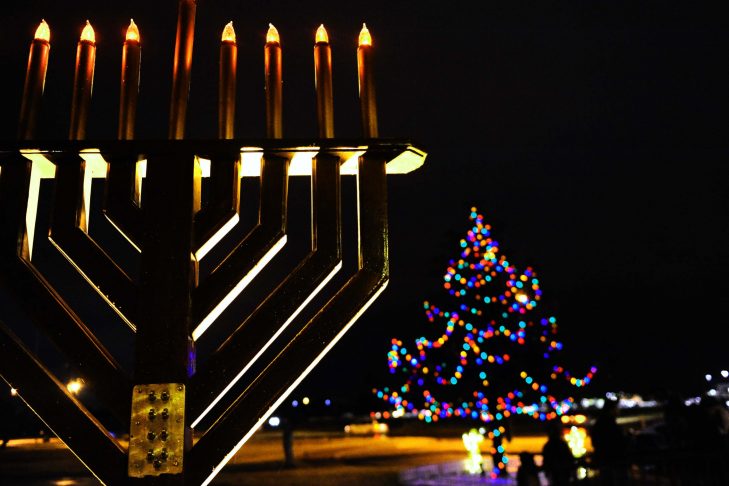I’m half-Jewish and grew up celebrating Hanukkah and Christmas. My husband was Catholic, confirmed and everything, but hasn’t set foot inside a church in about 25 years. Right now, we’re at a crossroads when it comes to how much religion (or tradition) we’ll provide for our kids. We celebrate both holidays.
It’s a common situation: These days, the intermarriage rate in the Jewish community is 47 percent. And, like so much else, any potential drama just might bubble to a head around the holidays. How much celebration is too much? Not enough? Who might get offended? Will grandma feel slighted if there aren’t stockings on the mantel or a menorah on the table? Is it possible to honor everyone’s heritage in a meaningful, peaceful, kid-friendly way?
I talked to six interfaith parents in Boston to see how they balance Hanukkah with other celebrations. These are their stories.
Chip and Wendy Pierce: A Hybrid Harmony
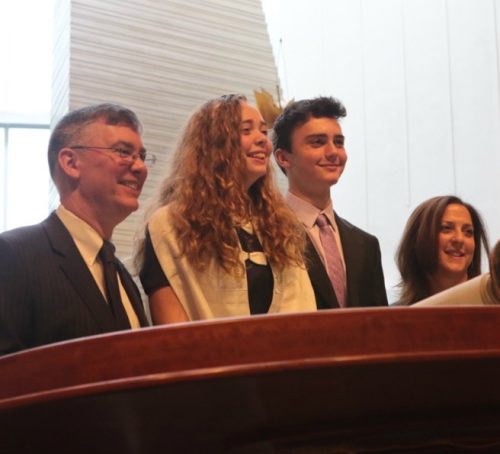
We have a Jewish family, but Chip wasn’t raised Jewish. We recognize that the holidays mean a lot to him and his family. When he and I married, his dad was active at Trinity Church in downtown Boston. Our kids never went to church with him, but we’d go to brunch on Easter. We’d celebrate Christmas at his dad’s house.
We’re raising our kids Jewish because I care, and Chip didn’t care. He’s culturally Christian; he loves organ music. But when Chip and I were getting serious, I said, ‘I don’t know how to raise children any other way.’ Both my parents were alive, and we spent every Sunday with them, and this is what I believed in. And he liked the idea that they would have something, some kind of religion.
On Hanukkah, we do it big on the first night. We do latkes and big gifts. I do eight nights of little gifts and candles. His dad [who has since died] loved it all. When we had my daughter Lulu’s naming at the temple, he was like, ‘Where do I get to stand?’ He loved that we were participating in something. He didn’t care what it was. After his wife died, he was just so happy to have family.
I was the third daughter not to marry someone Jewish. My mother said, ‘You were going to be my temple wedding!’ But my kids are more Jewish than any of us were. My son is really active in the youth group at our temple. He wants to go live in Israel.
My father-in-law’s memorial service was a huge deal at Trinity Church. And my son said, ‘I’ll recite the Kaddish.’ They had printed it in English and Hebrew. My 10-year-old, who was not that good at it, read the Hebrew, slowly. I told him, ‘Look, there is no cantor up there! You’re on your own!’ And he did it. And the church loved it.
—Wendy
Elliot and Barbara Targum: A Family Compromise
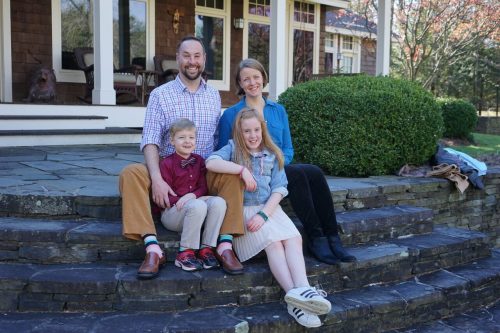
Elliot and our kids are Jewish. I’m Christian, raised Episcopalian. That’s my faith of record. Elliot was raised as a Conservative Jew, but he and his parents are now all Reform, and we belong to a Reform temple. Back when Elliot and I were dating, we knew that religion and our difference was important for us to sort out. Culturally, his religion was important to him. With the Jewish people as a minority, it was important to him to maintain the cultural traditions and not be part of reducing the number of Jews in the world. This took us some years to talk through and land on.
Before we had kids, we knew that I was not going to convert but that we’d raise our kids Jewish. As Reform Jews, this isn’t hard to do. We had a bris for our son and a baby-naming for our daughter. They go to religious school through our temple. There’s a lot of research about how Jewish camping influences Jewish identity. We have sent both kids to Grossman Day Camp. Our daughter now goes to Eisner Camp and our son will, too. We’re committed to getting through at least their bar and bat mitzvah, and then will let them get to a place where they can make a choice.
For my parents, it was a mild adjustment. Christians are the majority religion. There’s not the sense of threat of losing somebody to another faith. In Christian culture, people aren’t talking openly about numbers and losing people to interfaith marriages. My family wasn’t as devout. We were loosely Episcopal. I went to Sunday school, but maybe stopped in second grade? Once a year, I might go for Easter.
Now, we celebrate Christmas. I’m not super religious but Christmas is a special, wonderful time. The magic of Santa, spending time with family and enjoying the season is something that I didn’t want to sacrifice. Conversely for Elliot, this was something he was excluded from and it felt negative for him. It took him a while. The biggest thing was a tree. I wanted it. We struggled with it. Now he gets me a tree as a gift. I never pick out the tree; I don’t drive the bus. Elliot, and now our kids, go out and buy me a tree. I’lll come home at some point this month and find one in our house. He does it for me. This shifted it for him. He does this for me rather than feeling like I’m imposing Christmas on him.
And we celebrate Hanukkah as robustly as anybody. We light candles, we have a celebration similar to how Elliot’s family would have celebrated it had he married a Jew. And we send out holiday cards. It’s not a red and green bonanza; it’s something more neutral. And our kids identify as Jewish although they know I’m Christian. I think people underestimate how well kids can understand and adapt.
—Barbara
James and Mira Whiting: Finding a Balance
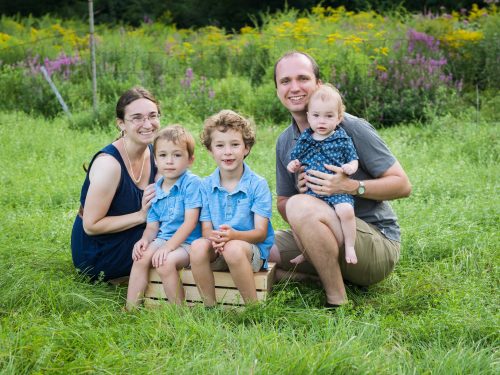
In our house, we just do Jewish holidays, but some years we go to my husband’s family for Christmas and some years we celebrate with local friends who I grew up with, who are Episcopalian.
I’m fully Jewish with a long history of secularism. James’s mom is Catholic; his dad is Methodist. They come from very religious families. His dad converted to Catholicism when his parents got married. James and his four siblings were raised Catholic, with CCD [education] and nightly Bible study as a family. I grew up going to the Workmen’s Circle, which is a secular cultural Sunday school set up with a Jewish cultural identity and social justice focus, and we were married by a rabbi.
My father-in-law died five years ago, but this isn’t something he was that worried about. He thought, ‘You’re doing something, which is good, and you’ll figure it out.’ I think my mother-in-law, who writes evangelical Christian books, is more bothered by it. We have gone to church with her, and once she was confused that I was upset that she wanted to bring the kids up for a blessing during communion.
There’s so much Christmas everywhere that it seemed like a good way to convey to the kids that it can be fun, and we can enjoy it, but it’s not necessarily our holiday. My husband was fine with that. He feels strongly about conveying his belief in God to the kids, but he’s not attached to rituals. He reads Bible stories with them and talks about it with them, but it generally doesn’t really come up a whole lot, because they’re still young. Now, in addition to the Workmen’s Circle, we’re members of Temple Isaiah. We love it. It’s a great community. And this year, we’ll visit family friends in Dorchester on Christmas.
—Mira
Fern and Ginny Remedi-Brown: A Christmas Mitzvah
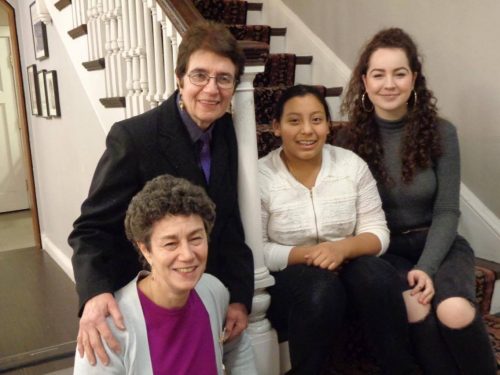
I was raised Jewish, although not strongly, religiously Jewish. My wife, Ginny, was raised Roman Catholic and had been a nun before leaving the order. My father was the only survivor in his family to survive the Holocaust, so it was really important to me that our kids be raised Jewish.
Now we belong to a Reform synagogue. We did that because it has a strong education and religious program. The music is beautiful, and the social action is strong.
Ginny felt Catholicism wasn’t [friendly] to gays and lesbians. Now she goes to an Episcopal church but never converted. And she comes with us to services. She can sing in Hebrew. And when we go to a service with her, it’s a mitzvah. We think of it as a mitzvah to celebrate Christmas with her. She makes a small wall Christmas tree with branches and attaches lights. She has a nativity scene. It’s important to her. And our youngest daughter is about to have her bat mitzvah.
—Fern
Tara and Phil Lasker: Embracing Culture When There’s Time
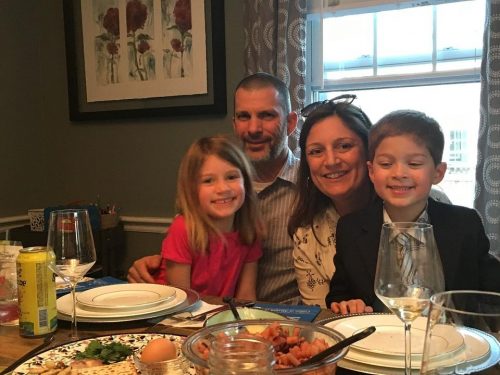
When Tara and I first stated dating, her mom pulled me aside and said, ‘You can have Christmas, but I have Thanksgiving.’ Religiously speaking, neither of us are practicing. I’m Protestant.
It’s probably a disappointment [to my mother] that we haven’t introduced faith, but she knows me. Growing up, I was never on board with it. To each their own. It wasn’t for me. I think both Hanukkah and Christmas aren’t in the minds of our kids as religious events at this point, and it’s time-driven. On a Sunday, I’d rather go for a hike with my kids. It’s not a priority for me. My brother goes to church, so maybe he gets bonus points. It’s less around the religious side of it. It’s more culture and tradition.
—Phil
I’m lazy about it! It’s about who is in my life and who else is stepping up. My sister married someone who is Jewish; they have a son who is Jewish and they celebrate everything, so they include us more in stuff. We’ll go to their seders. I want my kids to have the exposure to it, but I don’t prioritize it enough to lead it.
I feel the pressure, being Jewish and a minority, and all that. There’s pressure to keep it going for my kids. I want them to relate to being Jewish somewhat. The problem is how tough it is on us to keep that kind of stuff going. We light the menorah every night during Hanukkah; the real challenge comes with gifts. How do you rein this in? [Our daughter]’s birthday is on Jan. 1 on top of it. Everything is clumped together. My parents give Hanukkah gifts, and we each give one gift on the first night, not a huge thing. And this year we’re doing a menorah-building workshop at Home Depot. I try to sprinkle in things so they identify somewhat with being Jewish.
—Tara
Jeff and Kate Hadden: Continuing a Grandfather’s Tradition
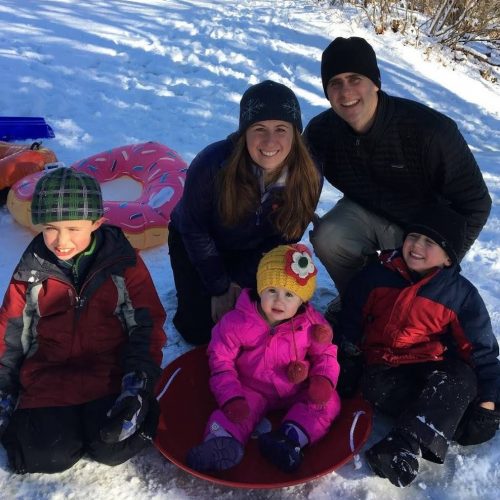
Jeff is Jewish. I was brought up Protestant but not practicing in adulthood. When we got married, we decided that we’d raise kids to identify as Jewish but incorporate all of our traditions. It’s more about traditions and family togetherness.
This was really important to Jeff. Jews are a minority culture and he felt a responsibility to continue it. His dad is Jewish, and he was raised that way. It’s something they share together.
We joined Temple Isaiah six months ago. Both of our boys are in Hebrew school. My third-grader is in a more formal program. My first-grader’s program is less formal and more play-based; it’s an introduction to some of the ideas. Temple Isaiah is very progressive and open, very community-oriented and super respectful and understanding of interfaith families. They’re amazing about that. I can’t say enough good things about how welcoming everyone is.
We pick and choose what we want to be part of. The temple knows that this is a big commitment. Both boys go to Hebrew school on Sunday mornings, and being Protestant, I used to go to church every Sunday. We did Sunday school. To me it’s similar to that. It’s been a bonding experience for Jeff and them, and they and our [younger] daughter will have bar and bat mitzvahs.
We celebrate Christmas and Hanukkah. We don’t celebrate Christmas in a religious sense. We talk about the traditions, put up a tree, Santa comes, we read “The Night Before Christmas.” But it’s more about family traditions and spending time together. Hanukkah is more religious in that we recite the prayers.
I’m totally comfortable with it. I’ve never been super religious, but I can incorporate what I love and grew up with. I never associated it with religion, and it doesn’t conflict. Our kids enjoy celebrating both. And both of our families are open and understanding. I think it was challenging that we didn’t get married in a church; we had a judge marry us. My parents always had a picture of me getting married in a church. But they’ve been understanding, even if they don’t know much about the traditions. On Jeff’s side, I think his dad was very happy that we were continuing that on and felt proud.
—Kate


